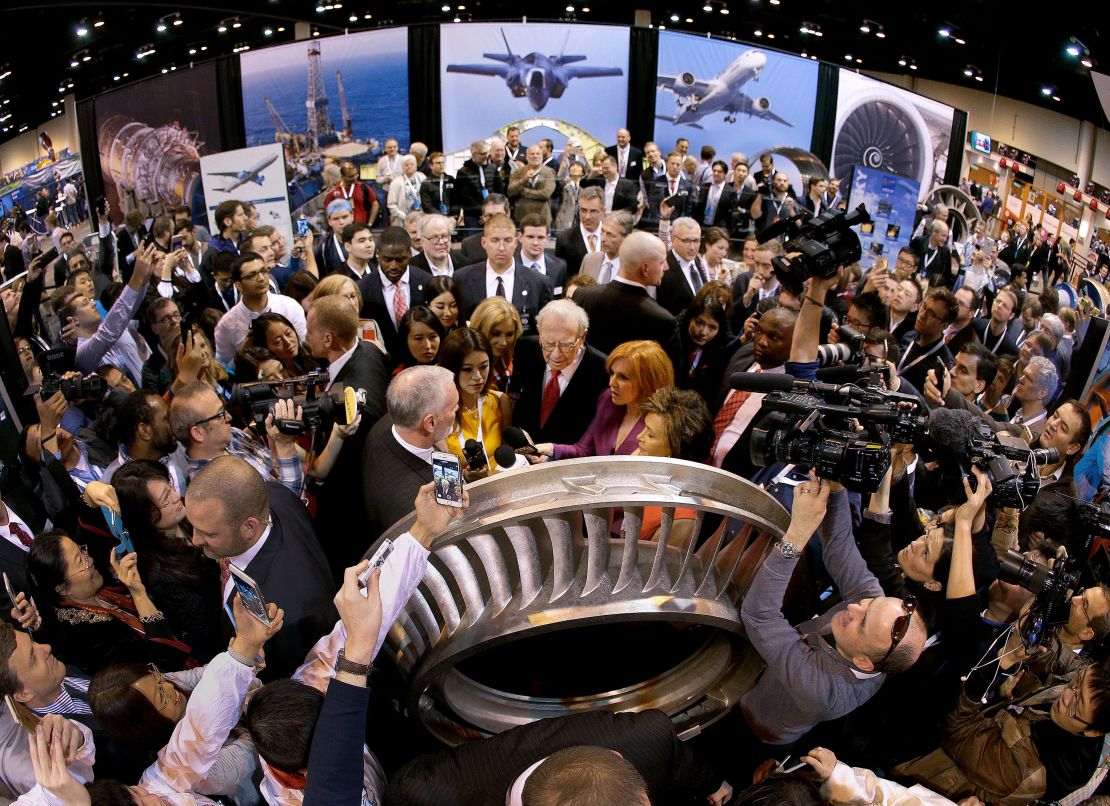CNN
—
It’s hard to think of anyone on Wall Street who contains quite the same contradictions as Warren Buffett. He’s a white-haired, ice-cream-eating, Cherry-Coke drinking avuncular figure — who has also cut some of the world’s sharpest deals and amassed a fortune bigger than some nations’ entire annual economy.
Buffett, 94, said Saturday at Berkshire Hathaway’s annual shareholder meeting that he would step down as CEO at the end of the year, handing the reins to his chosen successor, Greg Abel.
Abel, the chairman and CEO of Berkshire Hathaway Energy, has been a well-liked and respected lieutenant of Buffett’s for years. Buffett is known for picking adept managers for his many businesses, and even within that group, Abel stood out.
But for Berkshire Hathaway, for Wall Street — and maybe even for a certain vision of American capitalism — there’s no one like Buffett himself.
Warren Edward Buffett started life in a pretty good spot, the son of a father in the investment business who later became a congressman. Buffett was something of a 1950s nepo baby, starting his career in 1951 as a salesman for Buffett, Falk, & Co., his father’s investment firm.
Warren Buffett’s life in pictures
But the young Buffett started his own investment firm in 1956; less the a decade later, he owned a controlling stake in Berkshire Hathaway, then a struggling textile manufacturer in New Bedford, Massachusetts.
Berkshire would become his primary investment vehicle – and he turned it into a sprawling conglomerate. Buffett was a simple but rigorous investor: He didn’t buy what he didn’t understand, and he read voraciously and dug deep to understand everything he possibly could. Five hundred pages of reading a day was about right, he’s reportedly said.
He had one relentless focus above all: value. Buy great companies cheap, then build them up and hold them forever. Profit. Repeat.
That formula, along with the patience to keep piles and piles of cash parked until he saw opportunities worth pouncing on, helped make him at one point the world’s richest person. On Saturday, when he announced his intent to step down, the Bloomberg Billionaires list ranked him at No. 5, with a personal fortune of $169 billion.
The top four people on the list are all tech titans (Elon Musk and Mark Zuckerberg, for example). Buffett uses a landline, has an office without a computer and never sends emails.
But it’s not just his unmatched investment savvy that makes Buffett the Oracle of Omaha. It’s also his larger-than-life (but still tightly controlled) persona.
Devotees call Berkshire Hathaway annual shareholder meetings Woodstock for Capitalism. It’s a fair description. No other company hosts anything like it.
There is a giant showroom-style floor, with executives and representatives of many of his companies walking around. Buffett occasionally shows up to eat a Dairy Queen ice cream bar or, in years past, tossing a copy of the Omaha World-Herald newspaper onto the porch of a model Clayton home (all, of course, Berkshire companies getting free publicity by the cameras following him around).

One year, I remember Buffett came out to the floor accompanied by his security detail (necessary, given the hordes of fans trying to get anywhere near him) and did his routine stopping by the booths of his various companies. At one point I saw a quiet, nerdy man trailing behind Buffett, chatting with someone but otherwise going largely unnoticed. It was Bill Gates. The Berkshire Hathaway annual meeting, and especially the floor, might be the only place on earth where the Microsoft founder was an also-ran in the stakes for attention.
Berkshire companies present sell special meeting-only merch, from high-end trinkets at jeweler Borsheims down to Warren Buffett squishmallows. Yes, he even makes money off his own shareholders at his company’s annual meeting.
But the main event was the Saturday question-and-answer session by Buffett and his longtime partner, sidekick and bestie, Charlie Munger, who died in late 2023 at the age of 99. The two took questions on a giant stage, in front of thousands of cheering fans and shareholders (cans of Coke in plain view — Berkshire is a major investor in the beverage company).
The two dispensed everything from investment advice to folksy wisdom (Munger in particular the king of the quip). Through it all ran a strain of unbridled optimism in America — as a nation, as a place to make money, as a place to give opportunities to those who need it most. The two were cheerleaders for a vision that saw ever-more golden days ahead, figuratively and literally, even in times of turbulence.
Greg Abel is well known within Berkshire and to the company’s shareholders and followers. But it’s hard to picture him hawking Squishmallows of himself, or putting his face on a bottle of Heinz ketchup.
But Berkshire isn’t the same company as it used to be, either. Buffett has been open about how it’s harder to get the same eye-popping returns now that the company has gotten so much bigger. And the world, of course, has changed significantly this year alone, with President Donald Trump’s tariffs scrambling economic outlooks and possibly resetting a global monetary order.
“There’s never been someone like Warren,” Apple CEO Tim Cook wrote on social media Saturday. “And there’s no question that Warren is leaving Berkshire in great hands with Greg.”
